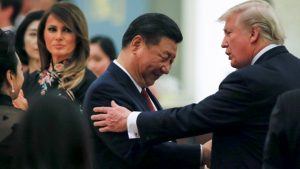Reihan Salam in The Atlantic:

In 2000, Congress made the fateful decision to extend “permanent normal trade relations,” or PNTR, to China. As the economists Justin Pierce and Peter Schott have argued, the permanence of PNTR status made an enormous difference: Without PNTR, there was always a danger that China’s favorable access to the U.S. market would be revoked, which in turn deterred U.S. firms from increasing their reliance on Chinese suppliers. With PNTR in hand, the floodgates of investment were opened, and U.S. multinationals worked hand in glove with Beijing to create new China-centric supply chains. The age of “Chimerica” had begun.
PNTR was a euphemism designed to get around the fact that the traditional term for “normal trade relations” was “most-favored-nation” (MFN) tariff status, which basically meant a plain-vanilla relationship. A country could enter into a preferential trade agreement such as NAFTA, the accord between the United States, Mexico, and Canada—say, plain vanilla with chocolate sprinkles on top. But short of that, MFN status meant imports would be treated as favorably as those arriving from “the most favored nation.” Absurd as it might sound, this linguistic convention had meaningful political consequences. To argue that we ought to have normal trade relations with China was one thing. Sure, why not? To make the case that China ought to be treated as our most favored nation was a more vexing PR challenge, not least in the wake of the brutal crackdown that followed the Tiananmen Square protests in 1989.
More here.
